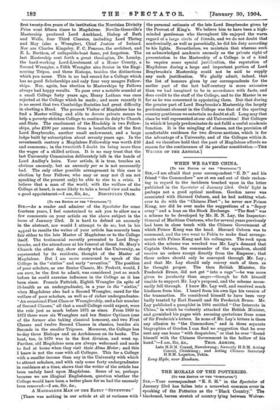SIR,—As a reader and admirer of the Spectator for some
fourteen years, I feel constrained to ask you to allow me a few comments on your article on the above subject in the issue of January 23rd. It is hard to defend an anomaly in the abstract, nor would I attempt to do so ; but in his appeal to results the writer of your article has scarcely been fair either to the late Master of Magdalene or to the College itself. The testimonial recently presented to Lord Bray- brooke, and the attendance at his funeral at Great St. Mary's Church the other day, show clearly what the University, as represented by its residents, thought of the Master of Magdalene. But I am more concerned to speak of the College in the "sixties" and early "seventies." The position of poor scholars, as our Senior Classic, Mr. Pesk-ett, would, I am sure, be the first to admit, was considered just as much before he could exercise influence in the College as it has been since. Francis Pattrick, Eighth Wrangler (in spite of ill-health as an undergraduate), in a year in the "sixties," when Magdalene also had a Second Wrangler, cared for the welfare of poor scholars, as well as of richer undergraduates. "An occasional First Class or Wranglership, and a fair number of Second Classes," all that a small College could expect, were the rule just as much before 1875 as since. From 1860 to 1873 there were six Wranglers and ten Senior Op times (one of the former also taking classical honours), and two First Classes and twelve Second Classes in classics, besides six Seconds in the smaller Triposes. Moreover, the College has to-day three Bishops and an Archdeacon on its books. The boat, too, in 1870 was in the first division, and went up. Further, old Magdalene men are always welcomed and made to feel at home when they visit their Alma Mater; and this I know is not the case with all Colleges. This for a College with a smaller income than any in the University with which to attract scholars, and with only some forty undergraduates in residence at a time, shows that the writer of the article has been unduly bard upon Magdalene. Some of us, perhaps because we are illogical Englishmen, question whether the College would have been a better place for us had the anomaly been removed.—I am, Sir, &c.,
A MAGDALENE MAN OF THE EARLY "SEVENTIES."
[There was nothing in our article at all at variance with the personal estimate of the late Lord Braybrooke given by the Provost of King's. We believe him to have been a high- minded gentleman who throughout life enjoyed the warm regard of a large circle of friends, and we do not doubt that academically, as well as parochially, he did his duty according to his lights. Nevertheless, we maintain that whereas such an acknowledged academic anomaly as the private right of presentation to the Mastership of a College is of a kind to require some special justification, the reputation of Magdalene during a large and important portion of Lord Braybrooke's Mastership could not be said to supply any such justification. We gladly admit, indeed, that the list of honours given by our correspondents for the earlier part of the last half-century is more extensive than we had imagined to be in accordance with facts, and does credit to the staff of the College, and to the Master in so far as be was concerned in appointing them. But that during the greater part of Lord Braybrooke's Mastership the largely predominant element in the College was that of the sporting country gentleman we entertain no doubt at all. Long may that class be well represented at our old Universities! But Colleges in which it largely predominates do not fulfil a useful academic function. It is the mingling of classes, not the provision of comfortable residence for two diverse sections, which is for the advantage of a University, and of the Colleges within it. And we therefore hold that the past of Magdalene affords no reason for the continuance of its peculiar constitution.—THE WRITER OF THE ARTICLE.'






















































 Previous page
Previous page